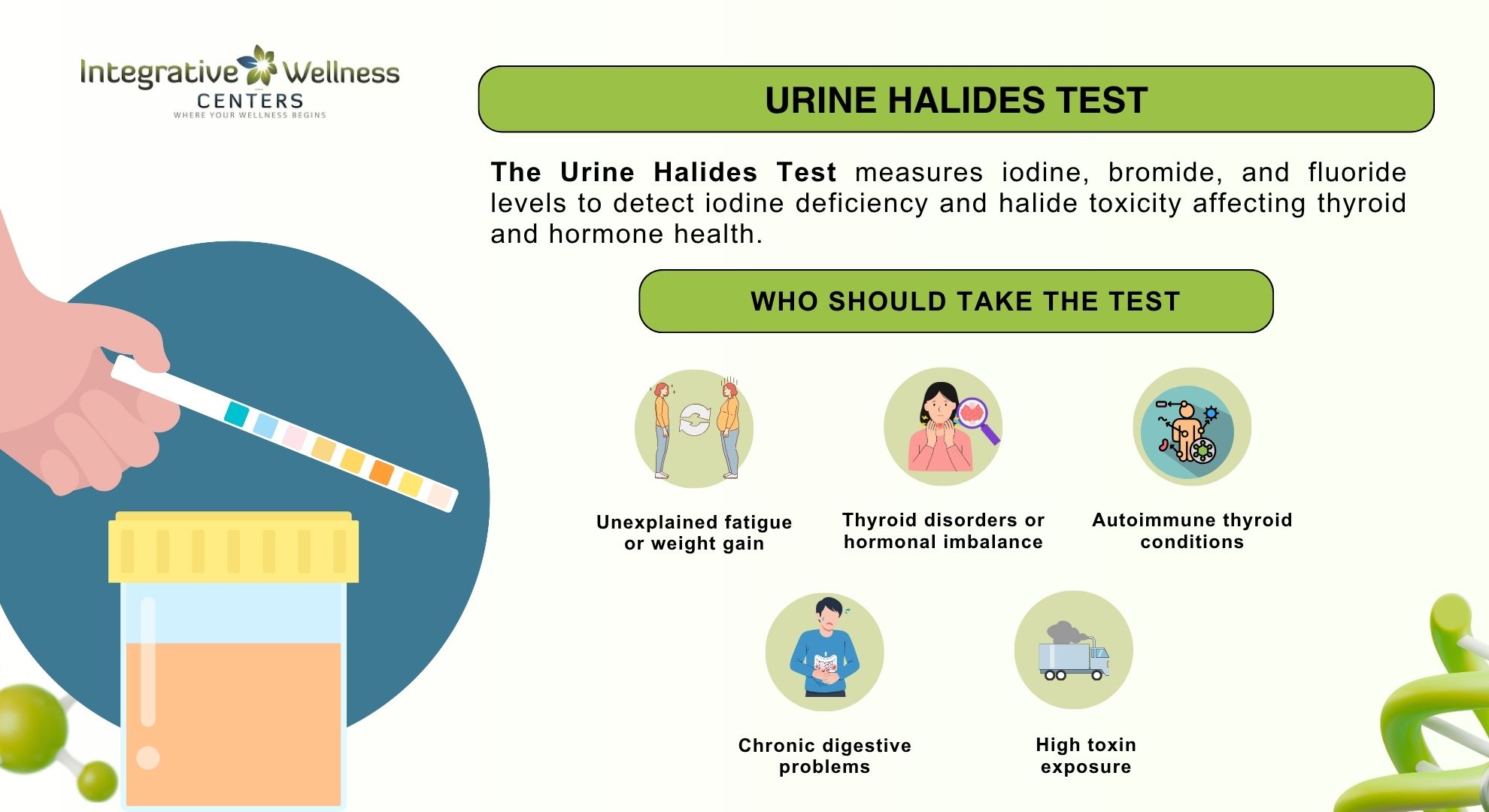The Iodine, Bromide & Fluoride Test also known as the urine halides or 24-hour iodine loading test is a functional medicine tool used to evaluate thyroid and hormonal health. It helps detect iodine deficiency and exposure to toxic halides like bromide and fluoride, which can block iodine uptake in the thyroid. Even mild deficiency may impact metabolism, energy, and hormone balance.
During the test, you take a 50 mg iodine dose and collect urine for 24 hours. If your body excretes less than 90% of the iodine, it suggests deficiency. The test also measures bromide and fluoride levels, which can accumulate and disrupt iodine function. This provides a full picture of iodine sufficiency and toxic halide exposure.
To uncover root causes of hormonal imbalances, many integrative practitioners use this test as part of a personalized care plan.

This test is ideal for people with symptoms or conditions linked to thyroid/hormone disruption. Consider testing if you have:
The Halides test measures urinary levels of iodine, bromide, and fluoride to give a snapshot of your iodine status and toxic halide burden. Key measurements include:
Collectively, these measures reveal whether you’re truly iodine-sufficient and whether any antagonistic halides are competing with iodine.
The urine halides test is typically performed with a 24-hour urine collection. Here’s the usual protocol:
1. Baseline Sample. (Sometimes) Provide a spot urine sample in the morning before taking iodine.
2. Iodine Load. Take a Lugol’s iodine tablet or solution (commonly 50 mg iodine) as instructed by the test kit or doctor.
3. 24-Hour Collection. Collect all urine for the next 24 hours into the provided container. This means saving every urination (except the first morning pee) in a large jug.
4. Lab Analysis. The combined 24-hour urine sample is sent to a lab (often using ICP-MS technology) to measure iodine, bromide, and fluoride levels..
5. Result Interpretation. The report will show how many micrograms of each halide were excreted.
This test offers several advantages in a functional medicine approach:
Key Takeaway: The Iodine, Bromide & Fluoride Test provides deep insight into your thyroid and hormonal system. It can reveal underlying causes of fatigue, weight issues, and metabolic problems.
Proper preparation ensures accurate results. Before your test:
The iodine halides test can identify or highlight:
At Integrative Wellness Centers, we use advanced testing like the Iodine, Bromide & Fluoride Test to uncover root causes of thyroid and hormone imbalances. If you're experiencing fatigue, weight issues, brain fog, or unexplained symptoms, this test helps us determine if iodine deficiency or toxic halides are playing a role.
Our team will guide you through the test process, interpret your results, and build a personalized care plan that may include nutritional support, detox strategies, or targeted supplementation. We also address related issues like hormonal imbalance, digestive problems, and autoimmune conditions to support your healing from all angles.
Ready to take the next step? Schedule your appointment today and let us help you restore balance naturally.
Protein levels, albumin, and immune markers help us understand gut health, nutrient absorption, and immune system function.
1. What is the iodine loading test?
It’s a 24-hour urine test done after taking a high-dose iodine supplement to see how much your body retains versus excretes.
2. Who should take this test?
Anyone with thyroid symptoms, hormone imbalances, fatigue, or suspected toxin exposure may benefit.
3. How do I prepare?
Avoid iodine-rich foods and supplements for 48 hours before the test. Don’t collect urine during menstruation and stay well hydrated without overdoing it.
4. Is the 50 mg iodine dose safe?
Yes, it’s safe for most people under supervision and is only used once for testing. Always inform your doctor of any thyroid conditions.
5. What do the results show?
Low iodine excretion suggests deficiency. High bromide or fluoride levels indicate possible toxic exposure.
6. How accurate is this test?
It’s one of the most reliable ways to assess whole-body iodine levels when done correctly.
7. Is the iodine patch test useful?
No, it’s not reliable. The urine halides test is much more accurate and evidence-based.
8. Does the test detect heavy metals?
No, it only measures iodine, bromide, and fluoride. Other tests are needed for metals.
9. What if I have Hashimoto’s or autoimmunity?
You can still take the test, but results should be reviewed with a provider experienced in thyroid and immune conditions.
10. What happens if I’m deficient or toxic?
Your provider may recommend iodine supplementation or detox strategies, depending on your results.
No more guessing, no more dead ends, no more endless referrals.
Request A Consultation